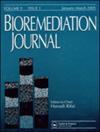利用铅污染土壤生物修复研究秀丽隐子抗氧化特性的新途径
IF 1.9
4区 环境科学与生态学
Q3 ENVIRONMENTAL SCIENCES
引用次数: 0
摘要
本文章由计算机程序翻译,如有差异,请以英文原文为准。
New approach of antioxidant properties of Zinnia elegans using bioremediation of Pb-contaminated soils
Abstract There is little information on the impact of soil amendments on lead absorption by ornamental plants as phytoremediation and the antioxidant system. The experiment was set up in a factorial based on completely block design with three replications on Zinnia elegans. [Pb (NO3) at (0, 40, 80, and 120 mg kg−1), soil amendment (control, diethylene trinitrilo pentaacetic acid (DTPA) 2.5 mM, DTPA 5 mM, humic acid 200 mg. L−1, and HA 400 mg. L−1)]. Increased Pb concentration resulted in a significant rise in antioxidant enzymes, as well as an increase in Pb absorption by Z. elegans. DTPA 5 mM and HA 400 mg. L−1 application lead to significantly higher shoot dry weight (49 and 56%), root dry weight (62 and 63%), catalase (CAT) (18 and 19%), peroxidase (POX) (63 and 67%), superoxide dismutase (SOD) (10 and 14%), and shoot Pb (36 and 33 mg.kg−1) in the contaminated soil, respectively. With the application of DTPA and HA, the residual Pb in soil fell in a negative association with the remediation factor. Z. elegans growing in polluted soils treated with DTPA 5 mM and HA 400 mg. kg−1 showed Pb tolerance by inducing an effective antioxidative response to Pb toxicity and enhancing Pb absorption for phytoremediation purposes.
求助全文
通过发布文献求助,成功后即可免费获取论文全文。
去求助
来源期刊

Bioremediation Journal
ENVIRONMENTAL SCIENCES-
CiteScore
5.30
自引率
0.00%
发文量
36
审稿时长
9 months
期刊介绍:
Bioremediation Journal is a peer-reviewed quarterly that publishes current, original laboratory and field research in bioremediation, the use of biological and supporting physical treatments to treat contaminated soil and groundwater. The journal rapidly disseminates new information on emerging and maturing bioremediation technologies and integrates scientific research and engineering practices. The authors, editors, and readers are scientists, field engineers, site remediation managers, and regulatory experts from the academic, industrial, and government sectors worldwide.
High-quality, original articles make up the primary content. Other contributions are technical notes, short communications, and occasional invited review articles.
 求助内容:
求助内容: 应助结果提醒方式:
应助结果提醒方式:


